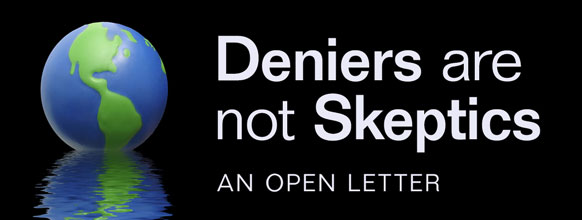Josh Rosenau wrote a piece for NCSE, “Standing up for Skepticism.” Much of what it addresses in relation to climate change works equally well for mythicism and other forms of denialism. For instance, he quotes Genie Scott as saying the following:
“The term “skeptic” has for several decades meant someone who applies critical thinking and who demands extraordinary evidence for extraordinary claims, as Carl Sagan put it. When topics like evolution, vaccination, and anthropogenic climate change have withstood the rigors of extensive scientific testing, it is extraordinary indeed to dismiss that wealth of good evidence. People who do that are not skeptics, but deniers of the scientific consensus.
When one considers the extensive skepticism that has been applied to the figure of Jesus by historians and other scholars, the same conclusion naturally follows.
Rosenau also quotes historian Spencer Weart, and I will take the liberty of substituting mythicism and history into the quote, to show that it is the same sort of phenomenon:
Every novel historical idea must scale a wall of skepticism. First it must overcome the resistance of historians who found the older ideas plausible. Changing the consensus of the experts is only a beginning, however; the public has yet to be convinced. That may never be completed if the new idea contradicts widely cherished assumptions about history. There is yet another barrier if the idea seems to attack established interests such as a religion or an industry. Then doubt is reinforced by denial: concerted efforts to represent the historical consensus as false. Nothing shows this process so clearly as the history of the idea that Jesus is a myth.
…the self-styled skeptics were not proceeding in a normal scholarly manner. Scholars continually test their beliefs, seeking out all possible contrary arguments and evidence, and finally publish their findings in peer-reviewed journals, where further attempts at refutation are encouraged. But the small group of scholars who oppose the consensus on the historicity of Jesus proceeded in the manner of lawyers, considering nothing that would not bolster their case, and publishing mostly in pamphlets, books, and newspapers supported by atheist interests. At some point they were no longer skeptics—people who would try to see every side of a case—but deniers, that is, people whose only interest was in casting doubt upon what other historians agreed was true.
What do you think? Is it a clear fit? Obviously the natural sciences are different in the kinds of evidence they deal with, and thus the degree of certainty they can offer, when compared with ancient history. But the similarities in tactics, attitude, and approach are striking nevertheless.













